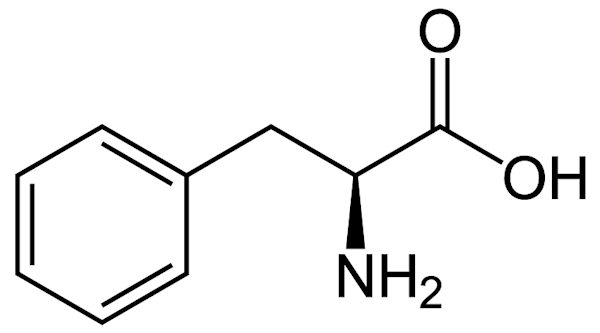If you’ve ever been given a can of Diet Coke or Diet Pepsi and it tastes a little off, or way off, you probably just toss it out. Why does this happen and what can you do about it?
Many diet soft drinks are sweetened with aspartame a leading non-nutritive sweetener that works very well in cold or room temperature foods. Aspartame is little more than 2 amino acids (aspartic acid and phenyl alanine) stuck together in a peptide linkage with one extra methyl group. This useful colored diagram came from the paper by Prodolliet, et. al. [1].

Aspartame was discovered in 1965 by James M Schlatter, while working at G.D. Searle. He said that he had made the aspartame (methyl ester) and was trying to recrystallize it to purify it, when some of the mixture bumped outside the flask. Later, when he licked his fingers to turn a page, he discovered a very sweet taste. Since he realized that the compound he made was unlikely to be toxic, he tasted it and found it extremely sweet indeed. In fact, aspartame is about 200 times as sweet by weight as sugar.
Searle patented this product, naming it Nutrisweet and Equal. Officially, aspartame has a half-life of about 300 days in solution at about pH 4, about the pH of soft drinks, but half life means that half if it as gone by that time. And if the cans are exposed to a hot storeroom or stored in a warm summer garage, they may deteriorate faster.
Why does it start to taste awful?
Diet sodas have a date on the package: it’s not the “sell-by” date, it’s the “use-by” date. Depending on you grocer, this may be 2 to 2-1/2 months from the date you bought it. Grocers are not too good at stock rotation of diet sodas, so it is up to you to make sure you don’t get an early one. Nearing the end of January, we have picked up cartons dates from Mar 21 to April 11 in the same stack! Unless you only buy one or two at a times, this won’t matter, but if you buy several on sale (and they all do this) you need to be watchful.
So what happens? Well, the simplest thing that happens is that the two amino acids come upzipped: this is called hydrolysis, since it always amounts to adding a water molecule at a carbon-oxygen bond. If you unzip aspartame into the two amino acids and remove that methyl to become methanol, you have a tasteless mixture of pretty harmless compounds. Your body easily metabolizes that bit of methyl alcohol and you are none the worse for it. This is described in the Prodolliet paper [1] and in the one by van Vliet [2].
What tastes so awful?
It is easy to understand that a solution of those two amino acids might well be tasteless, which is one of the outcomes when diet sodas age. But what about that really vile taste you sometimes encounter in old diet sodas?
I think there are two possibilities. If you look at the various steps aspartame undergoes as it unzips [1], you discover that one of the intermediate products is a form of diketopiperazine. The basic compound is shown below along with the derivative, sometimes also referred to as DKP that is actually produced:
Bothwick [4] has described the taste of DKPs as “bitter, astringent, metallic, and umami.” This is not surprising, since ring compounds with one or more nitrogen usually are pretty smelly. And a table of the concentrations of intermediates in van Vliet[2] shows that DKP occurs in significant amounts. But, in case you are concerned about their toxicity, Ishii et. al [3] studied aspartame and DKP for 104 weeks in Wistar rats and found no toxic effects at all.
The other possibility, albeit less likely, is another form of the sweetener called β-aspartame, which differs only in the position of that NH2 group: it is moved one carbon to the left. This isomer has a pronounced bitter taste, and does occur during aspartame decomposition, but in much lower concentration. But again, it is harmless.
Diet Coke mythology
You can’t discuss diet sodas for very long before someone brings up the old saw the diet sodas cause weight gain. The theory was that the sweetness induces hunger and you eat more actual food to satisfy it.
In 2008 Fowler and Williams[5] published a paper noting a correlation between obesity and diet soda consumption. A correlation, not causation. But in 2009, Chen and Appel [6] monitored 810 adults for 18 months, recording their beverage intake. They found weight gain from sugar sweetened beverages and but no weight gain from artificially sweetened beverages.
Finally, in 2012, Maersk and Belza [7] compared satiety scores for milk, sugar sweetened beverages and artificially sweetened beverages, and found no evidence that artificially sweetened beverages increased appetite or energy intake, concluding that “diet colas had effects similar to water.”
Regarding unfounded rumors that artificially sweetened beverages had some neurological effect, a panel of 10 experts examined all the current literature [8] and concluded:
The data from the extensive investigations into the possibility of neurotoxic effects of aspartame, in general, do not support the hypothesis that aspartame in the human diet will affect nervous system function, learning or behavior. Epidemiological studies on aspartame include several case-control studies and one well-conducted prospective epidemiological study with a large cohort, in which the consumption of aspartame was measured. The studies provide no evidence to support an association between aspartame and cancer in any tissue. The weight of existing evidence is that aspartame is safe at current levels of consumption as a nonnutritive sweetener.
So aspartame is safe before and after it degrades into the component amino acids, but for the best taste, you should check each package’s expiration date.
References
- Prodolliet, Jacques; Bruelhart, Milene (1993). Determination of Aspartame and Its Major Decomposition Products in Foods. Journal of AOAC INTERNATIONAL, 76(2), 275–282. doi:10.1093/jaoac/76.2.275
- Aspartame and Phe-Containing Degradation Products in Soft Drinks across Europe Kimber van Vliet,1 Elise S. Melis,2 Pim de Blaauw,2 Esther van Dam,1 Ronald G. H. J. Maatman,2 David Abeln,3 Francjan J. van Spronsen,1 and M. Rebecca Heiner-Fokkema2,* Nutrients. 2020 Jun; 12(6): 1887. Published online 2020 Jun 24. doi: 10.3390/nu12061887
- Toxicity of aspartame and its diketopiperazine for Wistar rats by dietary administration for 104 weeks H Ishii, T Koshimizu, S Usami, T Fujimoto DOI: 10.1016/0300-483x(81)90119-0
- 2,5-diketopiperazines in food and beverages: Taste and bioactivity, A Bothwick and NeilC DaCosta, Crit Rev Food Sci Nutr. 2017 Mar 4;57(4):718-742 doi:10.1093/jaoac/76.2.275
- Fueling the obesity epidemic? Artificially sweetened beverage use and long-term weight gain. SP Fowler, K Williams, et. al., Obesity (Silver Spring). 2008 Aug;16(8):1894-900. doi: 10.1038/oby.2008.284. Epub 2008 Jun 5.
- L Chen and L J Appel, et. al. Am J Clin Nutr. 2009 May;89(5):1299-306. doi: 10.3945/ajcn.2008.27240. Epub 2009 Apr 1.
- M Maersk, A Belza et. al., Eur J Clin Nutr . 2012 Apr;66(4):523-9. doi: 10.1038/ejcn.2011.223.
- B.A. Magnuson et al. Crit Rev Toxicol. 2007;37(8):629-727. doi: 10.1080/10408440701516184.










Gaining a molecule of methanol for every broken molecule of aspartame that decays doesn’t seem like a minor issue.
LikeLike
Except that it doesn’t accumulate. It is immediately oxidized to formaldehyde and then rapidly digested.
LikeLike
About your Diet Coke mythology: Artificial sweeteners absolutely do cause weight gain. The fact that they are used in animal farming should tell you this.
It was known since the 1960s that artificial sweeteners can increase feed efficiency (the amount of food that gets converted to body mass). This has been first observed with cyclamate in rats[1].
The exact mechanisms of this are still not fully clear. More recently it was proposed that artificial sweeteners enhance glucose transport in ruminants[2] which may be responsible for the observed increase in feed efficiency[3]. This happens also in non-ruminants[4] but quantitative effects due to that are yet to be measured.
[1] Dalderup et al., Effects of Sodium Cyclamate on the Growth of Rats compared with other Variations in the Diet, 1969; https://doi.org/10.1038/221091b0
[2] Moran et al., Sweet taste receptor expression in ruminant intestine and its activation by artificial sweeteners to regulate glucose absorption, 2014; https://doi.org/10.3168/jds.2014-8004
[3] Siruana et al., The effect of dietary supplementation of artificial sweetener on performance of milk-fed calves, 2014 https://www.researchgate.net/publication/268158371_The_effect_of_dietary_supplementation_of_artificial_sweetener_on_performance_of_milk-fed_calves
[4] Qian et al., Sucralose can improve glucose tolerance and upregulate expression of sweet taste receptors and glucose transporters in an obese rat model, 2021; https://doi.org/10.1007/s00394-020-02375-1
LikeLike